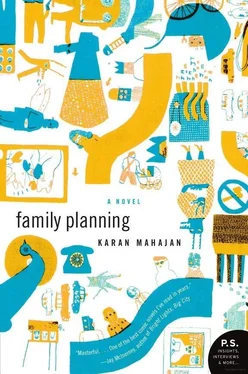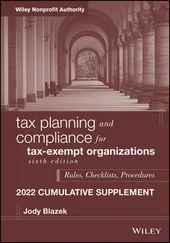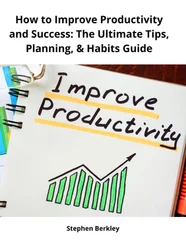The children’s jaws hung low with gobs of daal. In musical progression, hands fell on quivering laps. This was exactly the effect he’d intended to generate. Only Tanya had the courage to ask, “Why, Papa?”
Mr. Ahuja sat back in his chair and stared at the whirling fan above him; his body snapped instinctively into his favored posture for gravitas — shoulders relaxing backward, legs spread carelessly, arms dangling, and head and neck bent forward in hard earnest concentration. He scratched his stubble and explained the situation with Yograj’s corruption and the flyovers. He became animated as he spoke; he picked up his fork and jiggled it around; the table grew dense as everyone leaned in. The children were thrilled by this insider information. They salivated like journalists at an exclusive press conference. Even Arjun listened closely, slowly jabbing his butter knife between the quadrants of his outstretched hand. Despite himself, he felt proud of his father for his reasoning, and even prouder that he could present his father’s morally charged resignation to Aarti, who, no doubt, would be impressed. He’d even act as ponderous as his Papa when he told her the news. Unconsciously and silently he began repeating under his breath everything his Papa was saying.
He was clicked out of the trance when his father said, rather abruptly, “Also. I have been thinking about the way all of you behave. We are all used to talking back to our elders in this house — enough of this. From today it is going to stop. Everyone will listen to their elders, okay? Do exactly as you are told. If your elder does something bad to you, then write me a letter of complaint. I will fix the problem. But no talking back.”
Orders were orders, especially in a time of such tragedy. The children bent their heads especially low and chewed, for once, with their mouths closed. Only Sangita’s cucumber crunching proceeded at its usual volume, but even this Mr. Ahuja didn’t bother to correct. He still needed to tell her what had happened with Arjun.
But first he went to his study and placed a phone call to Vineet Yograj.
“Vineet saahb?” he said.
“Ah, Rakesh-ji,” said Yograj. He sounded tired and expectant. As if he, too, had bad news to share.
Mr. Ahuja launched forth, “Look, ji, I am sure you have received the letter. Before you say anything, I want you to know I did not write it. I hundred percent did not write it. This is Rupa-ji’s doing, I am certain. She has written it to promote infighting. The good woman has lost her mind, as you know. I am just now coming from seeing her. She has lost her mind. This is her—”
Mr. Ahuja cut himself off, not because he was finished but because he was surprised by the placidity of Yograj’s attitude at the other end of the line, his patience, his lack of aggressive interruption.
“Yograji-ji?”
“Rupa-ji has done it, no?” Yograj said. “Why is she doing this? What is her problem? Does she not have better things to do? This is what I also thought.” He shouted to his wife, off the phone, “Rekha! It is as I said. He did not write it. Why would he write it? Yes, exactly, Rakesh-ji, that is also what I thought. Why would you write it?”
Rakesh braced himself. “Yes.”
He heard the wife utter a few shrill remarks but couldn’t make them out.
“Sorry-ji,” said Yograj. “That was my good wife. Please ignore. You understand, she is disturbed? But, yes, I also thought, Rakesh-ji is such a technocrat, how could he write this? Why would he write this? For what purpose? For what need? Why so much anger?”
“Yes,” Rakesh mumbled.
He hadn’t expected Yograj to believe him. He hadn’t expected it to be so easy.
In fact, it wasn’t. Because after a few notes of desultory conversation, Yograj said, “Will you do one thing for me, Rakesh-ji?” His voice was now commanding and smooth, not the gruff rattly voice he used for questions. “Will you please write a letter to the party as a whole and say you did not write the letter, and that it is the work of Rupa-ji? Just so they know? So my good name is not blemished?”
Yograj’s good name . It came as a great surprise to Mr. Ahuja (though it shouldn’t have) that Yograj cared less about their mutual enmity and more about what others in the party thought of him. Mr. Ahuja’s comments had actually hurt him because they were so close to the truth. Immediately, the warm kindly feeling he’d started experiencing — the same feeling of forgiveness that overcame him after he slapped one of his children — was replaced by a sense of power. The slap had been necessary, and he was ready to deliver another.
Mr. Ahuja grinned broadly. “Okay, ji, whatever you desire,” he said.
Then he hung up the phone, switched on his computer in the study, wrote out a note to Yograj, and told him, in so many words, to go screw himself and his good name.
MR. AHUJA’S CAREER with the KJSZP (H202) was now emphatically over — he had no allies to speak of — but he was in an exuberant mood as he walked to the nursery. Behind him were the Flyover Fast-Track and its failures. The flyovers could look bombed and ruined, the ramparts of a city abandoned after a pillage, and he wouldn’t care. Years from now, he imagined, when archaeologists unearthed Delhi’s ruins, they’d find inexplicable bridges. We have several hypotheses, they’d say. People climbed up here to experience ritual hallucinations of tar…There is some proof that this is where salvos were fired at the Muslim invaders approaching from the Aravalli Mountain range…These were their temples, austere . If Delhi, as people loved to say, was a city of ruins, then at least his ruins towered over the rest.
“Everything is okay?” he asked, opening the door into Sangita’s den. His manner was courtly, servile, his hands fanned in front of him like the mascot for Air India.
Mrs. Ahuja was noncommittal as she strung all the smelly nappies on a cord that stretched across the room. “All the babies are crying,” she said. Then, by way of explanation: “Doing latrine.”
The magic of marriage. Mr. Ahuja hadn’t changed diapers in several months, but he was so grateful to see that Sangita was watching a soap opera and not NDTV — which no doubt would carry news of the latest developments — that he blitzkrieged through the nursery, turning the babies on their stomachs and sliding out the safety pins with panache. He mollified the infants with his old trick — a clicking of fingernails near their ears. Sangita watched the minister, fascinated. Mr. Ahuja felt at ease. His cell phone was vibrating in his pocket, a situation that only exacerbated his growing sexual frustration by alerting the nerves leading up to his penis. What attracted him about his wife right now as she cradled one of the twins in her lap was this: she was so available. He could suffer through the worst misfortunes in the world, and she’d be forced to stay with him. He could quit politics and still she’d be subordinate to him. He could lose the SPM’s patronage and be instantly axed from the party for his irreverent letter, and she’d still shyly fan the dupatta near her face when he asked her questions. He, too, would stand up to his antagonizers like a man — he wouldn’t make it easy for them. If they issued him a Show Cause Notice, he’d file a Breach of Privilege Motion in Parliament. He’d make such inflammatory remarks in the press that the Communist Party would back him in the creation of a Third Front. He’d explain everything to the press. The English-speaking press would like his good English. The Hindi-speaking press would like his good Hindi. They’d carry photographs of him with a fresh red tilak on his forehead, his showered bulk wrapped in a fancy kurta…
Читать дальше












